

FMIC 1ST QTR. 2023 FORESTRY MUTUAL INSURANCE COMPANY INSIDE OUR 1ST QUARTER 2023 EDITION: AGENCY CORNER - RISK ASSESSMENT - LEGAL BRIEF - SAW SHOP LEADING THE WAY INTO THE FUTURE
1st Quarter 2023
Letter from President and CEO Bill Dine 4 Partnerships are what shape the future for the industry.
LOGGER OF THE YEAR - VIRGINA 6 Virginia Forest Resources, LLC
This safety award recognizes Virginia Forest Resources. See what it took to be a Forestry Mutual Logger of the Year.
LEGAL BRIEF - Legal Advice from Setliff Law 8 Is your business covered against that loss?
AGENCY CORNER - Contracts 9
Start the year off on the right foot, understanding contract insurance requirements.
Partnerships in Forestry 10 Report from North Carolina Forestry Association.
AM BEST Upgrades Credit
Rating for Forestry Mutual 11 AM Best Press Release.
SAW SHOP: Cold Weather Edition! 12 Greg Helton goes into detail on how to stay warm while working in the woods during those cold days of winter.
ANNUAL REMINDER: 14 Claims Reporting and Drug & Alcohol Screening Requirements.
HOT NEWS: 15
Forestry Mutual expands it's eligible classes of business.
LEGENDS IN FORESTRY - Loss Control 16
Forestry Mutual's own Loss Control team is this quarters Legends. We spend a day with Virginia Occupational, Safety & Health as they learn first hand what take place and the safety concerns on a logging site.
Partnerships in Forestry 19 Report from Carolina Loggers Association
Partnerships in Forestry 20 Report from Tennessee Forestry Association.
Partnerships in Forestry 21 Report from Virginia Logging Association.
THE RISK ASSESSMENT - Forklift Safety Reminder 22
Greg Plumley, Loss Control Director.
Partnerships in Forestry 24 Report from Mississippi Forestry Association.
Cold Weather Safety Tips 25 Tips to help you stay warm by.
LOSS CONTROL - Customer Service Driven 26
See why Forestry Mutual leads the industry and why you should join the Mutual Team.
ANNUAL REMINDER 27
OSHA Recordkeeping Requirements.

CONTENTS
2 FMIC 1ST QUARTER 2023
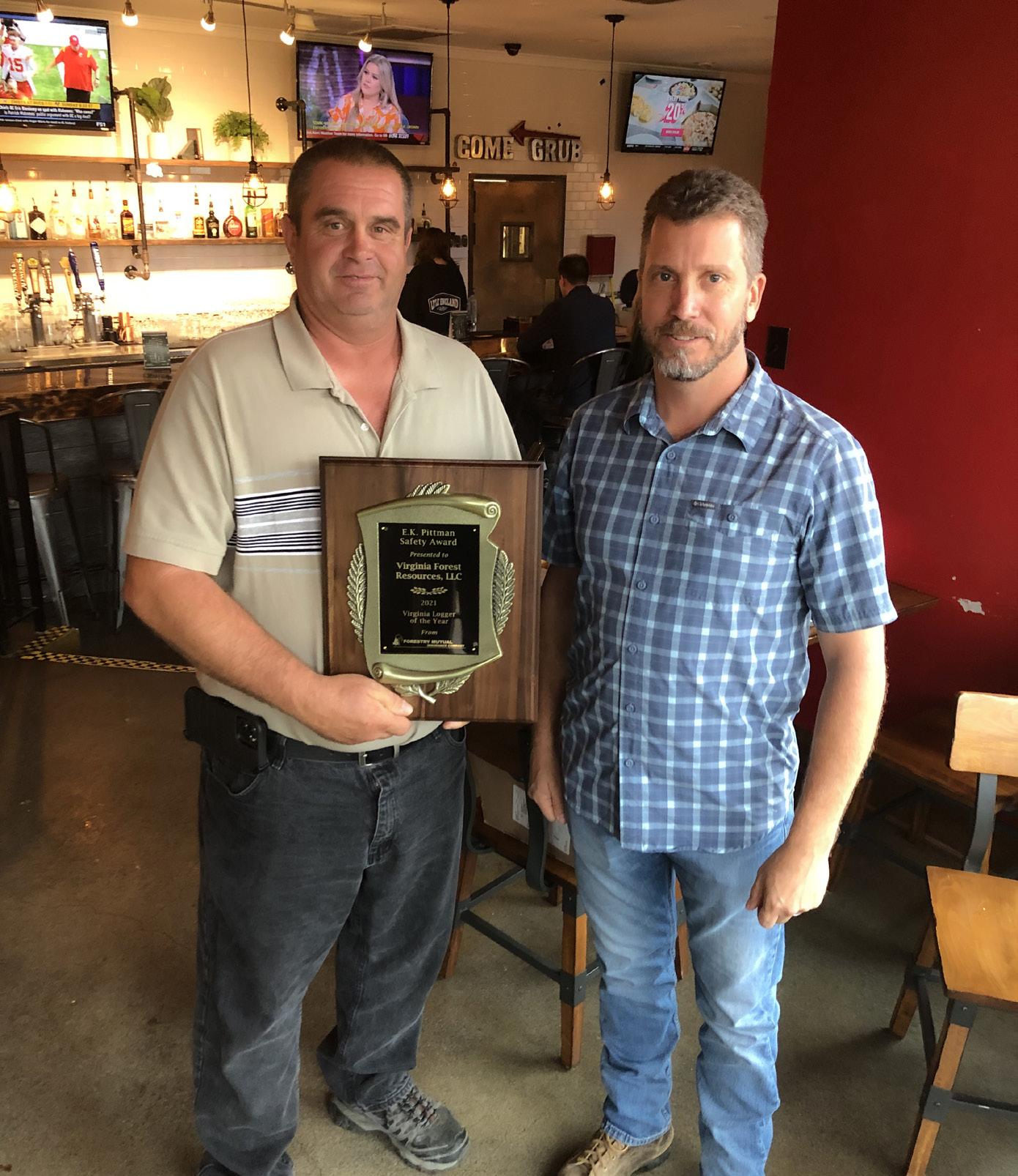
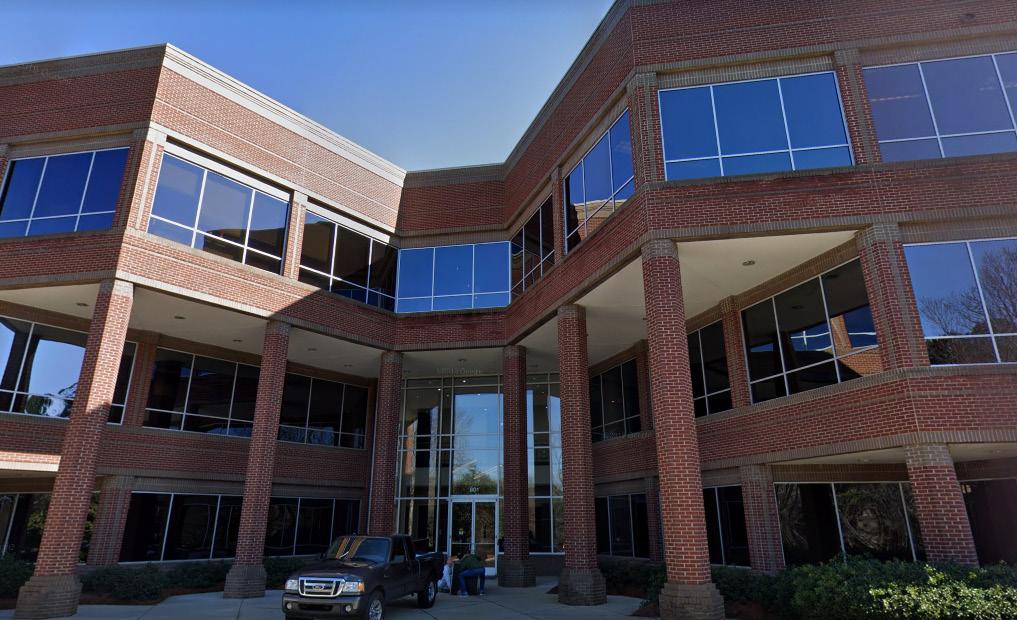
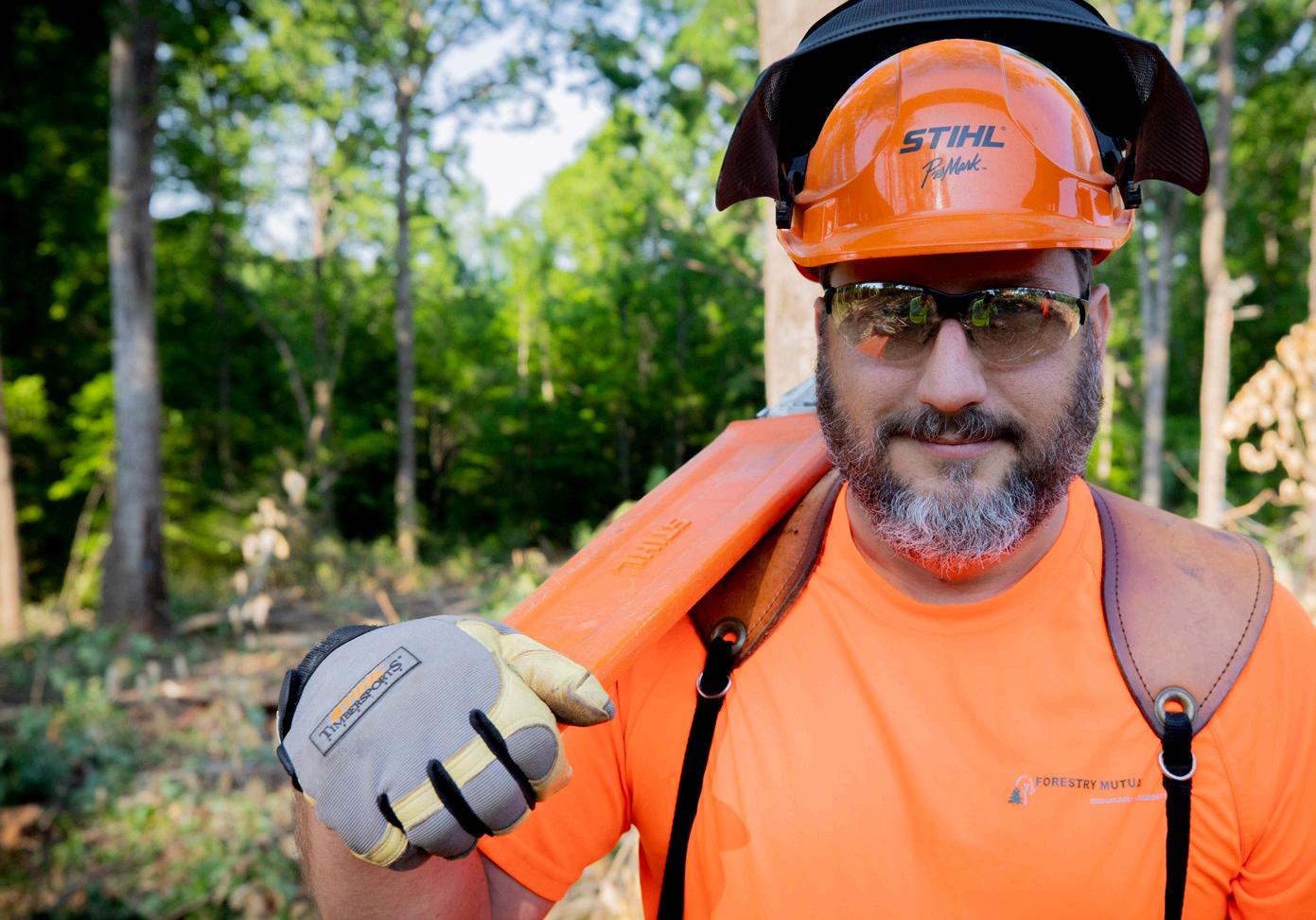

FORESTRY MUTUAL INSURANCE COMPANY 801 Jones Franklin Road Suite 100 Raleigh, NC 27606 (800) 849-7788 www.forestrymutual.com FMIC AGENCY P.O. Box 19467 Raleigh, NC 27619 (866) 755-0344 www.fmicagency.com FORESTRY MUTUAL BOARD OF DIRECTORS CHAIR Michael Walters DIRECTORS Tommy Barnes Chip Capps Joel Cathey Randy Denman Candace Dinwiddie Joey Ferguson John Hatcher Mike Macedo Tedrick Ratcliff Bernard Rose Marshall Thompson Matt Thuman FMIC 1ST QUARTER 2023 3 12 SAW SHOP Cold Weather Edition. VA LOGGER OF THE YEAR 6 9 PAGE UNDERSTANDING CONTRACT INSURANCE REQUIREMENTS VIRGINIA FOREST RESOURCES, LLC
BUILDING THE FUTURE TOGETHER

4 FMIC 1ST QUARTER 2023
“As always, Forestry Mutual will remain a supportive and engaged partner as we grow and prosper together.”
BUILDING FORESTRY MUTUALS FUTURE TOGETHER
Bill Dine, President & CEO

Since joining the Forestry Mutual Team, I have had the pleasure of meeting with many of you. My visits with our association partners and policyholders have been a powerful reminder of our combined dedication to the quality of the forest products family. As you would expect, one of the main topics of conversation in many of these meetings was the importance of continuing to work and prosper together. Our agents and partners have enabled Forestry Mutual to become one of the region's premier insurance carriers for over fifty years. We look forward to expanding upon these relationships as we continue to grow in the coming year.
As we move into 2023, I am very pleased with the direction of Forestry Mutual. The upgrade of our AM BEST rating to an A- will allow us to successfully write more business in this competitive industry. The ability to serve more policyholders while expanding our policy base across all territories is key to our growth and success in the future. While we look to the future, we must remember our current strengths and successes.
Forestry Mutual will continue to be the leader in providing our policyholders with a best-in-class loss control experience. What our loss control has to offer is no secret. We must continue to share and deliver these valuable services with our current and future clients as we grow our Forestry Mutual family.
Some of the services offered include:
• Truck Driver Safety Classes, both in the classroom and on-site instruction
• New Employee Training Guide Development
• Safety Policy Development
• Lockout/Tagout Training
• Annual OSHA Training & Mock OSHA Inspections
• Safety Policy and Rules
• On-Site Chainsaw Training
• Safety Videos
• Safety Meetings - On-site
• Fire Prevention (T.E.A.M.)
• Weekly Safety Alerts
• Monthly Safety Sheets
These are only a few of the numerous educational and safety services provided to our policyholders. To learn more, visit www.forestrymutual.com or contact your field representative.
Forestry Mutual is committed to providing policyholders with the tools necessary to keep their employees safe. These services are available to all policyholders at no additional cost: it is part of our lifelong commitment

and dedication to the forest products family.
To our tireless and dedicated staff behind the scenes, thank you for your dedication to and hard work for Forestry Mutual last year. Your efforts are greatly appreciated.
FMIC 1ST QUARTER 2023 5
Bill Dine
Forestry Mutual Insurance Company honored its Virginia Loggers of the Year with our September E.K. Pittman Award for 2021 in New Kent, VA. The honorees were Dan & Colleen Hockenburger of Virginia Forest Resources, LLC, West Point, VA.
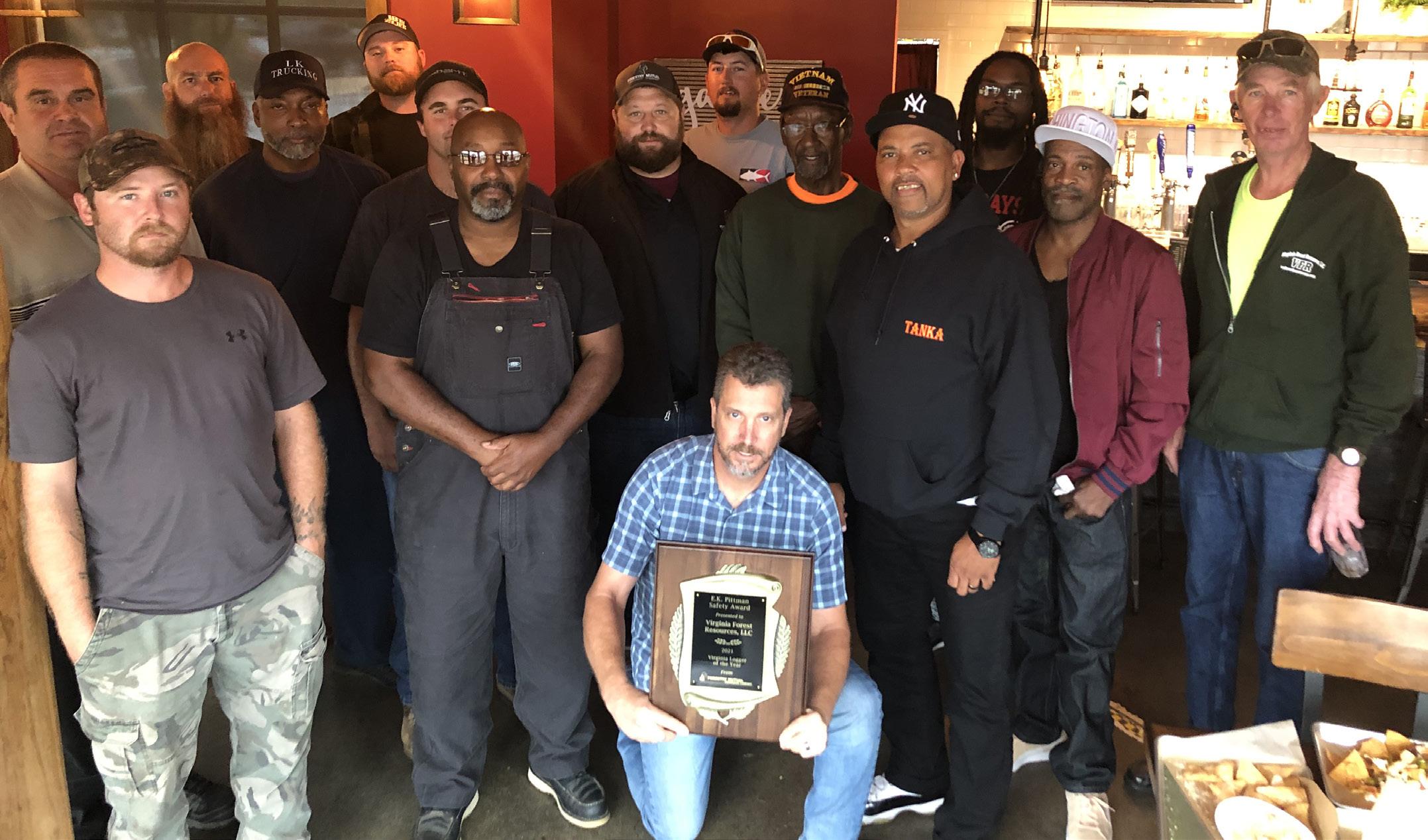
The Award is named in honor of the first Chairman of the Board of Trustees of Forestry Mutual and presented to those companies chosen by the president and staff of Forestry Mutual based on their safety record and continued emphasis on safety in the workplace. This is Forestry Mutual’s most prestigious Award. Mr. Pittman served from 1971-1984 and was a strong proponent of Safety Training & Education and the use of Personal Protective Equipment.
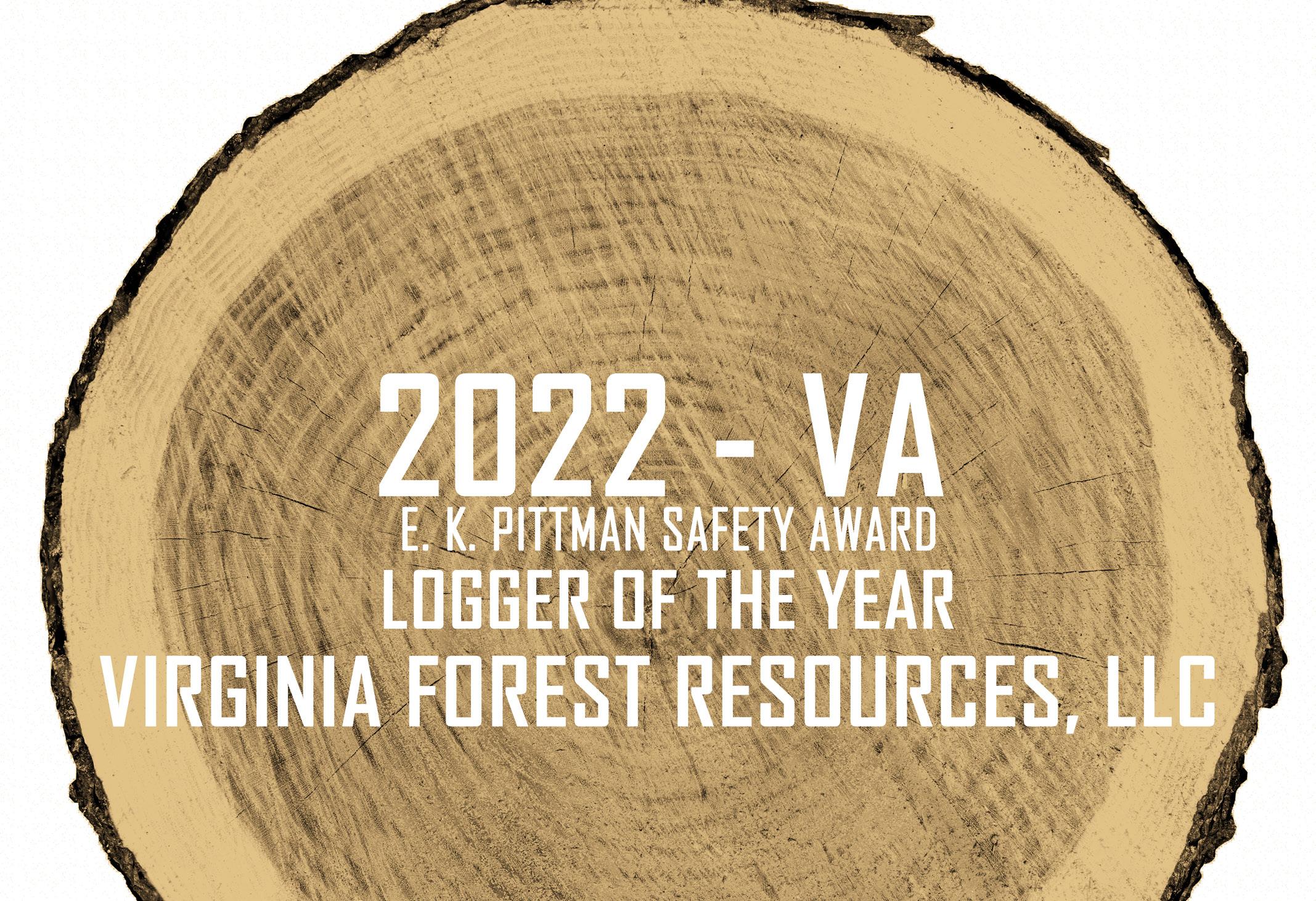
6 FMIC 1ST QUARTER 2023
The Logger of the Year Award recognizes only topperforming logging companies that show a genuine concern for the safety of their organization and employees and go above and beyond the basic safety requirements to ensure a safe and productive work environment.
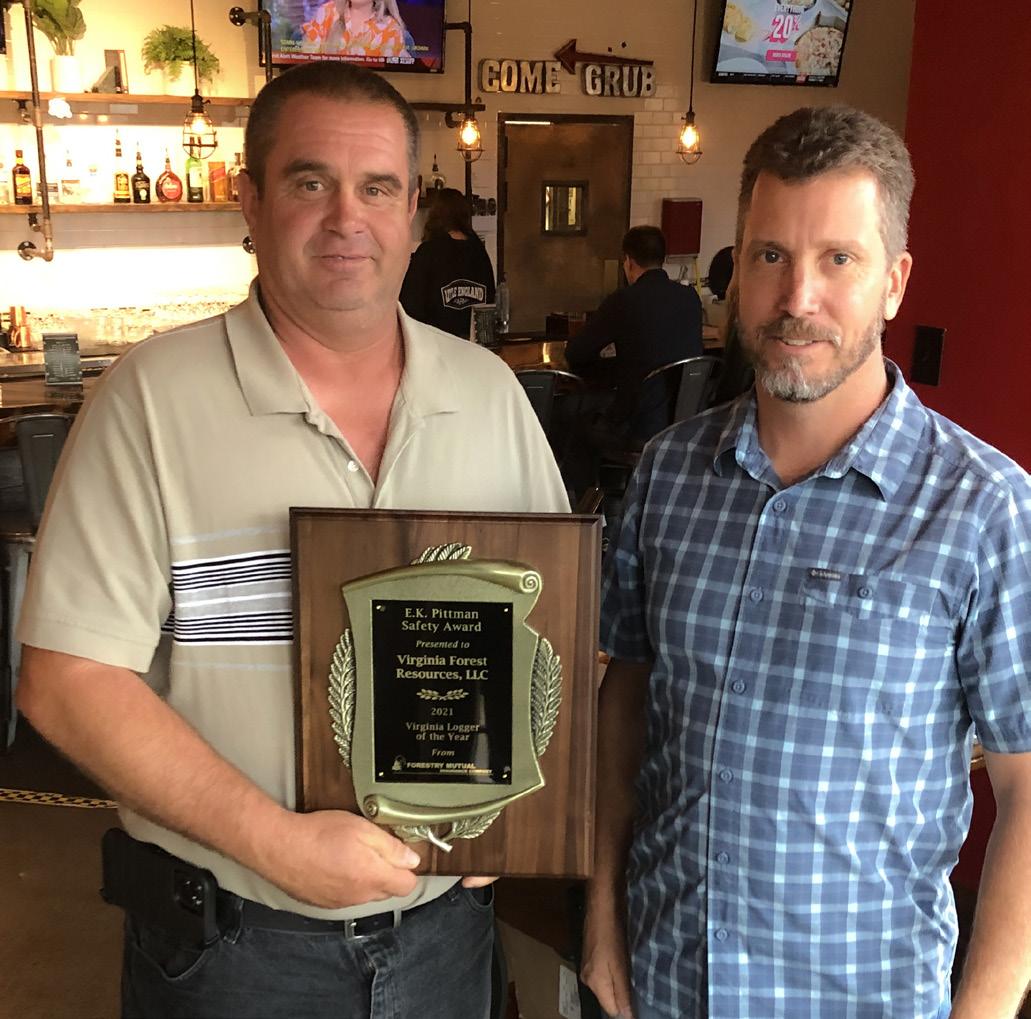

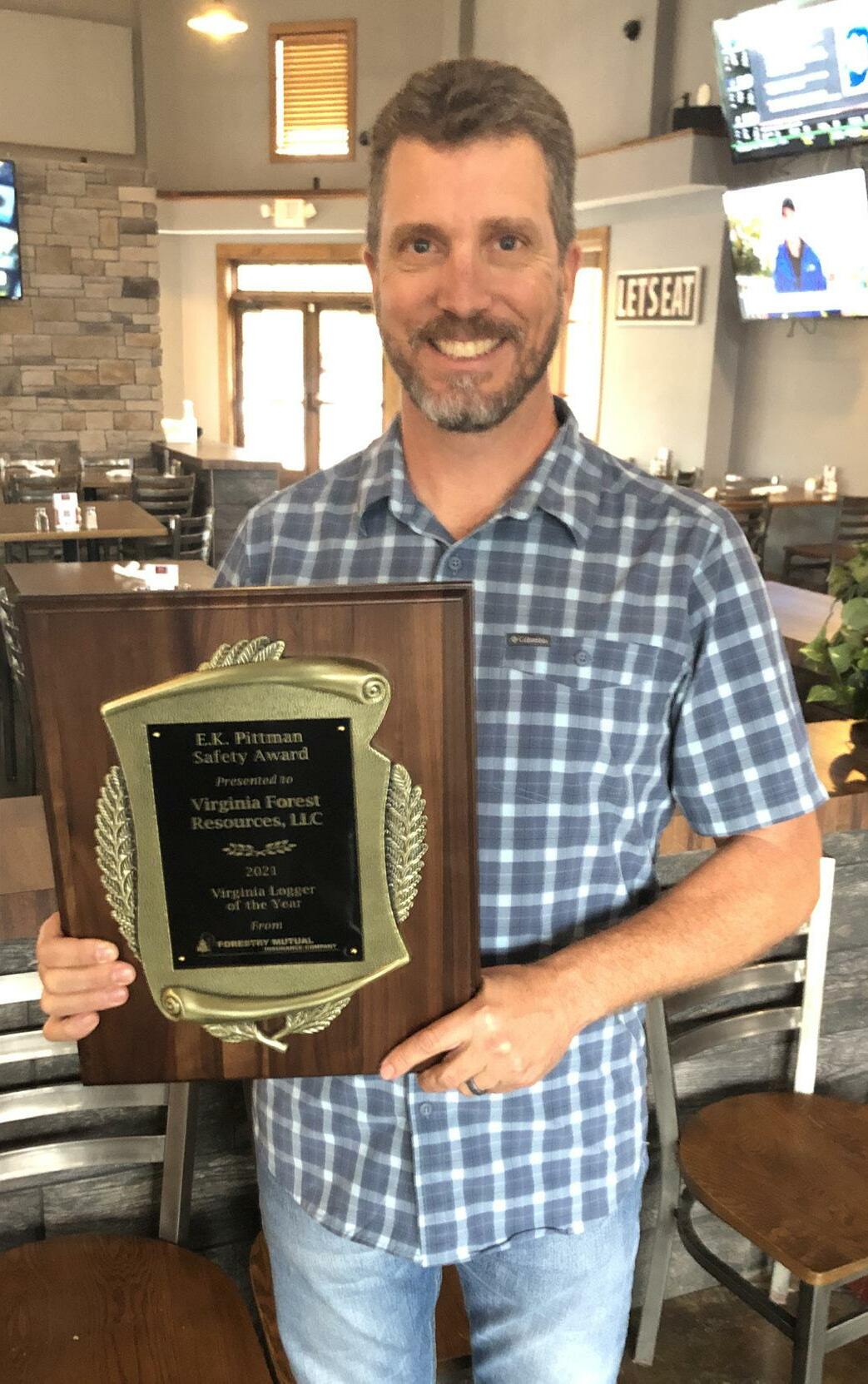
Virginia Forest Resources has been a Forestry Mutual policyholder since 2014 and employs 12 people, 7 in the woods on the two crews and five drivers. Their safety record speaks for itself. Over the last eight years as a policyholder, Virginia Forest Resources has had a loss ratio of 0% in loss claims. An impressive feat for a company.
Virginia Forest Resources is one of those jobs if you are driving by their crew, you know it is them immediately. Virginia Forest Resources operates two logging Crews and a trucking company VFR Hauling, LLC. With all their moving parts on a logging site and the number of trucks they use with trailers equipped with headache racks, both on trucks and trailers you can see the value they have for safety.
Dan goes above and beyond what we, as an insurance company, ask for and utilizes the many services offered by Forestry Mutual.
SHAWN FULKS, FORESTRY MUTUAL PRESENTS
Dan got into logging via his interest in forestry. He never planned on logging but plans changed, and Dan’s U.S. Marine background helped him to adapt and overcome. Since their motto is “Improvise, Adapt, and Overcome all obstacles in all situations,” that is exactly what Dan did when the mill he worked for closed. In 2014, Dan started his logging operation and has not looked back. Dan has stated numerous times how fortunate he has been to have good people working for him, which contributes to the success of his business and is a big reason he is receiving this Award.
Forestry Mutual guarantees extensive loss control services and is proud to continue to serve Dan and Colleen Hockenburger and their employees. It is just not every day that a policyholder can guarantee the service in return. Virginia Forest Resources exemplifies how a logging company can be productive and safe through proper and stable safety provisions.
FMIC 1ST QUARTER 2023 7
DAN HOCKENBURGER WITH THE VIRGINIA LOGGER OF THE YEAR AWARD.
LEGAL BRIEF
By Charles S. "Steve" Setliff Owner & Managing Partner, Setliff Law
The wood products industry is unique. Like every other industry, insurance is fundamental for protection against risk and associated liabilities in the logging world. However, the word “insurance” causes most people and businesses to change the subject or postpone indefinitely coming to grips with the reality of their risk-management condition.
Companies cannot afford to have this attitude. They must understand the coverages they have in place, what losses are actually covered, and how much of their risk exposure is insured. In other words, is your insurance doing what you think it does or what you want it to do?
The first step in answering those questions is a thorough analysis and audit of your insurance as part of your company’s risk management plan. Setliff Law has had a good working relationship with Forestry Mutual Insurance Company (FMIC). Their knowledge and expertise have helped companies write the correct insurance needed to avoid legal hassles when a claim occurs. While insurance agents and brokers like FMIC are your obvious starting point in managing risk and providing insurance options, they cannot offer legal opinions on what your insurance does (or doesn’t) provide for you. In Virginia and many other jurisdictions, an insured has a duty to read its insurance policies and cannot rely on its subjective understanding of what its policies insure.
Hence, the importance of an insurance audit. The process starts with examining your company and operations under a microscope to ensure you have the necessary coverage. Information related to operations, records, employees, management, and other areas is reviewed to determine insurance exposure.
States have their laws on what types of insurance and limits are required. For example, Virginia requires workers’ compensation insurance for any business with two or more employees. Sound simple? Unfortunately, it is not, as many companies utilize independent contractors regularly and operate in multiple jurisdictions. On top of that, many companies are really separate entities but still operate in a related industry. They utilize the same employees, complicating who the employer is and what company needs to carry insurance. Does each company qualify as an insured under each policy you rely on?
Commercial general liability insurance (CGL) generally insures against liability for bodily injury, personal injury, and property damage caused during your business’s operations. In theory, it may sound like CGL would broadly cover your business from a wide variety of losses. In practice, however, a company will not find out whether it is covered for a particular loss or claim until after the claim arises. Companies must understand what losses and claims are insured before they occur, or else face the possibility of a denial of insurance coverage just at the moment insurance is most needed. Adding insult to injury, cyber and data breaches involving sensitive information have become increasingly common, exposing companies to liability in various ways until recently unthinkable. If you have cyber insurance, what losses does it exactly cover? Should you have cyber insurance?

Being proactive will help bring peace of mind to your company and clarify how insurance protects your operations. We are here to help review your existing policies in light of your risks and offer legal opinions you can rely on.
Please get in touch with Pete Schurig (pschurig@setlifflaw.com) at 804-377-1276 or Kevin Streit (kstreit@setlifflaw.com) to learn more at 804-377-1270 or visit www.forestrymutual.com.
8 FMIC 1ST QUARTER 2023
YOUR BUSINESS COVERED AGAINST THAT LOSS?
YOUR
IS
TAKING INVENTORY OF
INSURANCE
UNDERSTANDING CONTRACT INSURANCE REQUIREMENTS

In recent years, the timber and wood products industry has experienced more emphasis on insurance requirements in contracts for materials and services rendered by the provider. Most of these requirements deal with the liability involved in providing such services. One item we continually see being requested of the provider is the Additional Insured status for the party receiving services.
By definition, an Additional Insured is a person or organization not automatically included on an insurance policy but added at the policyholder's request. Usually, this is requested because of a close relationship between the two parties and/or a requirement of the contract between the two parties. A typical example would be a logger delivering wood to a mill, where the mill, as part of the agreement for buying the wood, will request that the logger name the mill as an Additional Insured on their liability policy. Also, a mill might be required by the buyer of their product to designate the buyer as an Additional Insured on the mill's liability policy.
When a policyholder requests that an Additional Insured be added to their policy, the insurance company does this by endorsement. The endorsement names the Additional Insured and sets the parameters of when the Additional Insured would receive benefit from the coverage. Typically, the endorsement will indicate that the Additional Insured will only receive benefit with respect to liability arising from "your work" for the Additional Insured. Thus the benefit to the Additional Insured would be protection on "your" policy first, or primary, not the Additional Insured's policy. Also, an Additional Insured may receive written notification if your liability coverage is in danger of being canceled for non-pay. However, no current statutes make this a requirement.
There is a cost to the policyholder for adding Additional Insureds to the policy. The cost structure varies between insurance companies. You may be charged a fee for each Additional Insured or, depending on the number of Additional Insureds you request. Some insurance companies offer a Blanket Additional Insured Endorsement with which you can add as many Additional Insureds as needed for a set fee.
Whether you are a logger, timber dealer, contract trucker, or mill, you have seen an increase in various insurance requirements as part of your contracts to supply material and services. You can become a better business manager with more knowledge of these requirements. Contact your agent for a better understanding of your insurance coverage.

FMIC 1ST QUARTER 2023 9
members to its ranks and provides continuing education to 1500 loggers per year. It would not be the great success that it is without FMIC’s involvement.
In addition to FMIC’s contributions to the ProLogger program, their team remains active on the NCFA board of directors, safety, logging and transportation committee and they have played a huge role in the production of the Mid-Atlantic Logging, Biomass and Landworks Exposition.
NORTH CAROLINA
North
Carolina Forestry Association “IT IS TEAMWORK THAT REMAINS THE ULTIMATE COMPETITIVE ADVANTAGE”
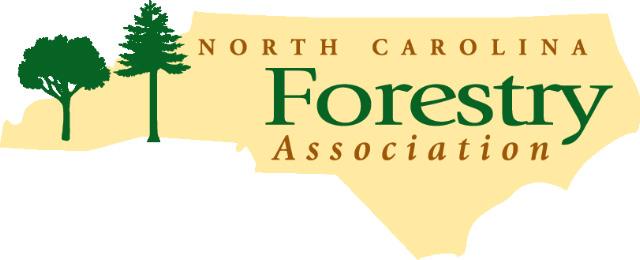

- PATRICK LENCIONI
Dr. John Hatcher, Executive Director, North Carolina Forestry
Association
The North Carolina Forestry Association’s (NCFA) partnership with Forestry Mutual Insurance Company (FMIC) began in 1971 with the inception of the North Carolina Forestry Association’s Self-Insured Fund. The mission then was to provide affordable workers' compensation insurance for the forest products industry and develop safety programs to keep loggers safe and stabilize insurance rates. Over time the Self-Insurer Fund evolved to become Forestry Mutual Insurance. While their structure has changed over time, their mission and partnership with NCFA has remained the same.
In 1994 the NCFA and FMIC teamed up with the North Carolina Department of Labor, the North Carolina State Highway Patrol, and the North Carolina Forest Service to develop the ProLogger Program, which promotes business, safety and environmental stewardship in the logging sector. The ProLogger Program continues to be first in class thanks to the data-driven insights that FMIC brings to the table each year. Their analysis of claims and current incident trends in the industry helps guide NCFA’s development of content that is timely, relevant and will help our members reduce accidents and costs every year. The ProLogger Program adds approximately 100 new
The partnership that NCFA and Forestry Mutual has embodies Lencioni’s quote because it takes every aspect of the forestry supply chain utilizing specific strengths and working together in order to be successful in moving the forest products sector forward.

10 FMIC 1ST QUARTER 2023
Forestry Mutual Insurance Company
AM Best Upgrades Credit Ratings of Forestry Mutual Insurance Company
FOR IMMEDIATE RELEASE
OLDWICK - AUGUST 30, 2022 12:20 PM (EDT) AM Best has upgraded the Financial Strength Rating to A- (Excellent) from B++ (Good) and the Long-Term Issuer Credit Rating to "a-" (Excellent) from "bbb+" (Good) of Forestry Mutual Insurance Company (FMIC) (Raleigh, NC). The outlook of these Credit Ratings (ratings) has been revised to stable from positive.
The ratings reflect FMIC's balance sheet strength, which AM Best assesses as very strong, as well as its adequate operating performance, limited business profile and appropriate enterprise risk management (ERM).
The ratings upgrade reflects the sustained improvement in FMIC's balance sheet strength, which is supported by risk-adjusted capitalization at the strongest level, as measured by Best's Capital Adequacy Ratio (BCAR). The improved assessment is the result of several factors: strong policyholder surplus growth over the past five-year period; solid liquidity metrics; favorable loss reserving trends; and the maintaining of a solid reinsurance program with a manageable retention. Further, surplus growth, coupled with a lower premium base, has led to declining underwriting leverage measures. AM Best expects that FMIC's operating profitability will continue to increase the company's surplus base prospectively.
The ratings also reflect FMIC's adequate operating performance, which is supported by disciplined underwriting practices and a conservative investment strategy. The limited business profile reflects the company's position as a monoline workers' compensation writer for the logging and forestry industries, which exposes it to risks associated with the timber industry, such as changes in demand for wood products. AM Best considers the company's ERM framework and risk management capabilities to be appropriate for its risk profile. FMIC is recognized for its aggressive safety and loss control processes, along with a commitment to long-term stability for its members.
This press release relates to Credit Ratings that have been published on AM Best's website. For all rating information relating to the release and pertinent disclosures, including details of the office responsible for issuing each of the individual ratings referenced in this release, please see AM Best's Recent Rating Activity web page. For additional information regarding the use and limitations of Credit Rating opinions, please view Guide to Best's Credit Ratings. For information on the proper use of Best's Credit Ratings, Best's Performance Assessments, Best's Preliminary Credit Assessments and AM Best press releases, please view Guide to Proper Use of Best's Ratings & Assessments.
AM Best is a global credit rating agency, news publisher and data analytics provider specializing in the insurance industry. Headquartered in the United States, the company does business in over 100 countries with regional offices in London, Amsterdam, Dubai, Hong Kong, Singapore and Mexico City.

FMIC 1ST QUARTER 2023 11
PRESS RELEASE
SAW SHOP
By Greg Helton, Chainsaw & Logging Safety Trainer
Saw Maintenance: Cold Weather Edition
The frost is on the ground, and all the equipment windows are covered with it. You can see your breath. You pull your trusty chainsaw out of the toolbox to begin the day. A winter wonderland of timber awaits. You flip the choke on and lock the saw in the leg lock to start it. You give the start rope a swift pull. And you pull, you pull, and you pull, and nothing. There are only a few things more burdensome than a chainsaw that will not crank.
Along with the frustration of a failure to start comes fatigue. Constantly pulling on a chainsaw to start it will wear on your energy level, causing more fatigue. Fatigue can lead to accidents.

So, let’s talk about some general saw maintenance tips that may help us on those cold mornings.
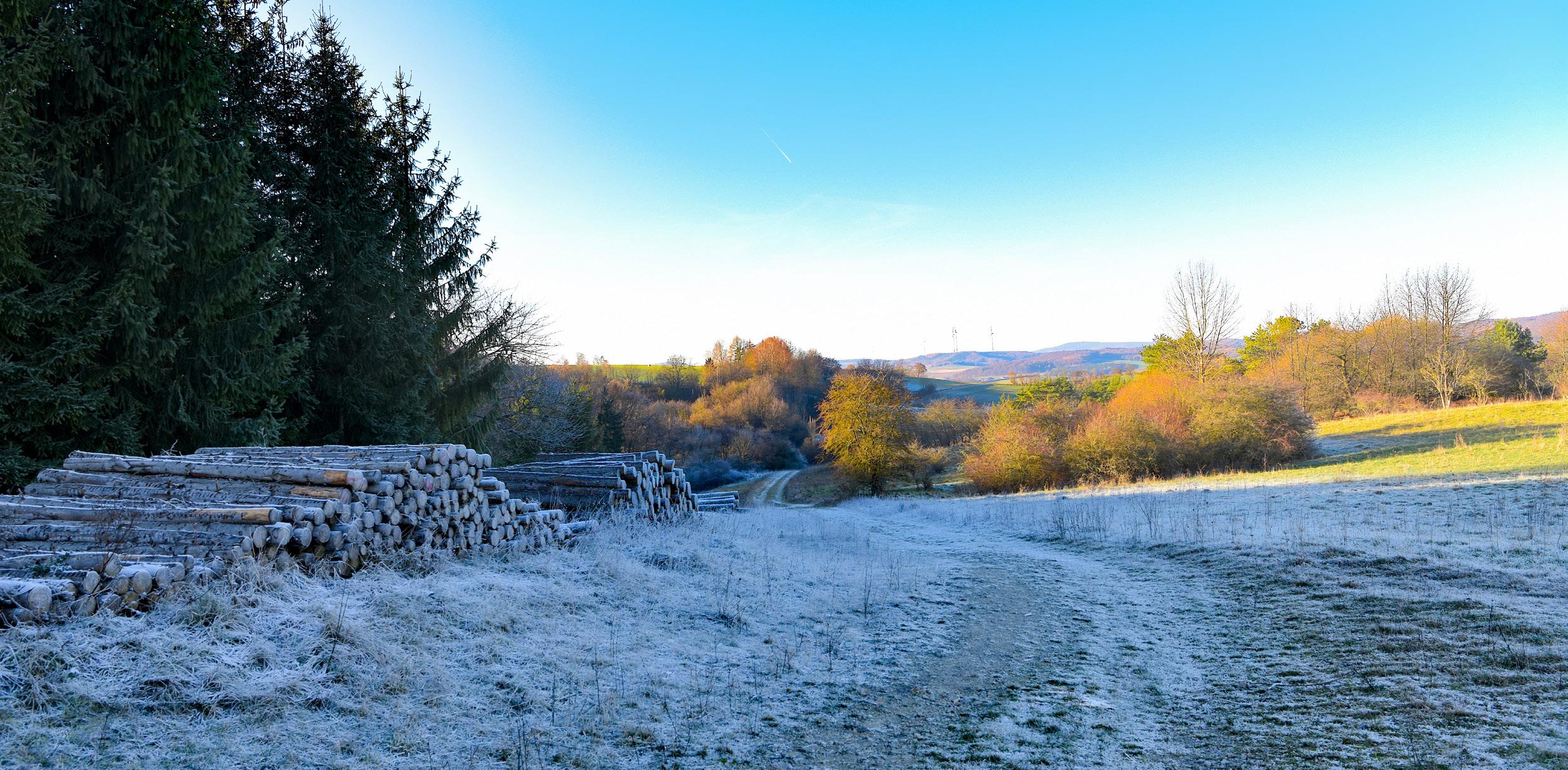
SHOP MAINTENANCE:
• Visibly inspect the saw for broken or loose parts.
• Check the Anti-Vibration mounts
• Check the chain brake, chain catch peg, and throttle interlock
• Check and clean the air filter; it will not run properly with no air
• Check and replace the fuel filter; it must have fuel to run
• Check the spark plug; replace it if fouled. It must have a spark!
• Ensure the spark arrestor is clean and functional
• Inspect the clutch for stretched or broken springs

• Use compressed air to thoroughly clean out built-up debris (Don’t forget safety glasses!)
• Replace any damaged parts
DAILY FIELD MAINTENANCE:
• Visibly inspect the saw for broken or loose parts
• Remove the side cover and clean built-up debris
• Clean the guide bar and oil holes
• Check the guide bar for wear and burrs, and file if needed
• It is recommended to flip the bar each time the chain is changed
• Check the chain sprocket for wear
• Replace the chain and tension appropriately
• Check the sharpness of the chain; sharpen if needed
• Check the depth gauges; file to the appropriate level
• Check the air filter, and clean it if needed
12 FMIC 1ST QUARTER 2023
Chainsaw problems can be narrowed down to three areas; fuel, air, and spark issues.


FUEL:
Be sure you are running a proper mix for your chainsaw. It is a good idea to run non-Ethanol gas in the highest octane you can find. If the saw is sitting for long periods, it may be beneficial to run a premix fuel such as Stihl’s MotoMix. Another good idea is to keep some extra fuel filters in the service truck in case you have issues. Also, check the fuel lines for cracks or leaks.

AIR:
As I have listed twice, keeping the air filter clean is important. In the field, removing the filter and knocking it out to remove debris is easy. When time allows, it may require washing it with Stihl special cleaner or soapy water. Allow the filter to dry thoroughly before reinstalling it.
SPARK:
The spark plug can be easily checked by removing the plug from the saw. Reconnect the plug wire and hold it against a metal surface on the saw. Pull the rope and look for a spark. If there is no spark, replace the spark plug. If there is still no spark, it could be in the ignition.

Clean around the flywheel and ignition and check the gap between them. Replace the ignition if there is still no spark.
After checking these items, the chainsaw is still not starting properly; compression may be a problem. A quick compression test can be done in the field. Set the saw on the ground. Pick the saw up by the start rope. The compression is bad if the rope pulls out and the saw stays on the ground.
Good compression should cause the saw to come up when you pick it up by the start rope. Having a chainsaw that will not crank when needed falls under those dynamic factors we talked about last quarter. If you are frustrated with a chainsaw that is not running correctly, you may not recognize the hazards around you.
These general maintenance tips help keep your chainsaw running correctly during the cold weather. It helps keep you focused and not frustrated during the day. Be safe, and as always, if you would like to schedule chainsaw training for your crew, contact your Field Rep.
FMIC 1ST QUARTER 2023 13
ANNUAL REMINDER
Greg Plumley – Director of Loss Control
Claims Reporting and Drug & Alcohol Screening Requirements
The following information assists policyholders in meeting their obligation for properly reporting injuries to Forestry Mutual and explaining when a drug & alcohol screening is required. Policy and procedures can be located in the FMIC Operations Manual Section F Claims Reporting.
1. FMIC Operations Manual, Section III, Loss Control Procedures, F, Claims Reporting, 3. a. states:
All policyholders are required to notify the Mutual of any employee accident, for which a doctor’s visit is needed within 24 hours of the date on which the policyholder or any of its supervisory personnel is first made aware of the injury.
Should the policyholder fail to provide such notice, the Mutual may deny coverage for the unreported claim and may seek reimbursement by the policyholder for any payments made by the Mutual as the result of the unreported claim.
A. Call 1-800-849-7788 to report claims promptly or use the appropriate State forms on our website. www.forestrymutual.com Click on the claims box on the left side.
B. If you feel a claim is not legitimate, report your suspicions as soon as possible.
C. If you have any questions regarding the status of a claim, reporting a claim, completing a form, or the
validity of a claim, please get in touch with the claims department immediately.
D. It is imperative that the policyholder immediately notifies the claims department when a claimant returns to work. Also, any change that you feel may affect the claimant’s status, such as termination of employment, knowledge of another job, etc., should be reported immediately.

2. FMIC Operations Manual, Section III, Loss Control Procedures, F, Claims Reporting, 3.b. states:
Any injury to an employee that requires emergency treatment at a medical facility will require a drug and alcohol screen by that treating facility. It is the policyholder’s responsibility to order the drug and alcohol screen from the treating facility. If the policyholder cannot obtain a drug and alcohol screening at the time of treatment, immediately contact the Mutual’s claims department at 1-800-849-7788 and request their intervention. If, in any case, the employer fails to fulfill this requirement, the Mutual may deny coverage of the claim.
3. Techniques to Reduce Claims Costs
The best way to control the cost of both your minor and major compensation claim is to avoid the emergency room when possible. We encourage all policyholders to establish themselves with a local general practitioner and orthopedic group with the understanding that when feasible, all injured employees will be directed to one of these doctors first as opposed to the emergency room.
4. OSHA Record-keeping Requirements
OSHA requires employers to post a summary of the total number of job-related injuries and illnesses that occurred during the previous calendar year. Summaries must be posted from February 1 to April 30, 2022. However, employers need only post the Summary (OSHA Form 300A), not the OSHA 300 Log. If you had no recordable injuries or illnesses in 2021, you still must post the form with zeros on the total line.
In order for employees to view the OSHA 300A Summary, post it in a common area such as a break room or on a bulletin board, or wherever you post other important notices to employees. Also, a reminder that employers with ten (10) or fewer employees, and employers in certain industry groups, are normally exempt from federal OSHA injury and illness record-keeping and posting requirements. ~FMIC
FMIC 1ST QUARTER 2023 14
AM BEST upgraded our insurance ranking in 2022 to the A- Excellent rating. Forestry Mutual now offers our outstanding insurance programs and phenomenal customer service to a new list of companies like never before. If you have any below-listed services or know of someone who does, keep Forestry Mutual in mind and get your quote today. Together we can make a difference.


LOGGING OPERATIONS:

SAWMILL, PALLET, LUMBER

MILLS:
- Sawmill Operations - Permanent & Portable - Planing Operations - Pallet Manufacturing - Mulch & Grinding Operations - Barrel Manufacturing - Log Home Manufacturing - Plywood Manufacturing - Veneer Mills - Dry Kiln Operations - Resaw Operations - Box & Crate Manufacturing - Truss Manufacturing - Wood Flooring Manufacturing


WOOD RELATED OPERATIONS: - Cabinet Manufacturing - Wood Furniture Manufacturing - Furniture Stock Manufacturing - Furniture Frame Shops - Furniture Assembly Operations - Wood Turning Operations - Carpentry Shops - Church Pew & Altar Manufacturing - Moulding & Millwork - Wooden Door Manufacturing - Casket Manufacturing - Wood Component Operations

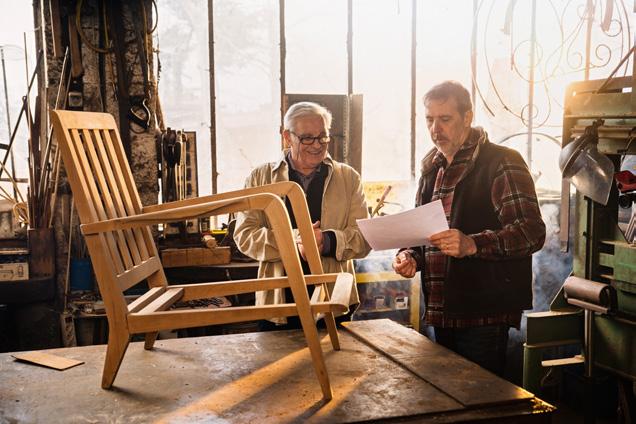
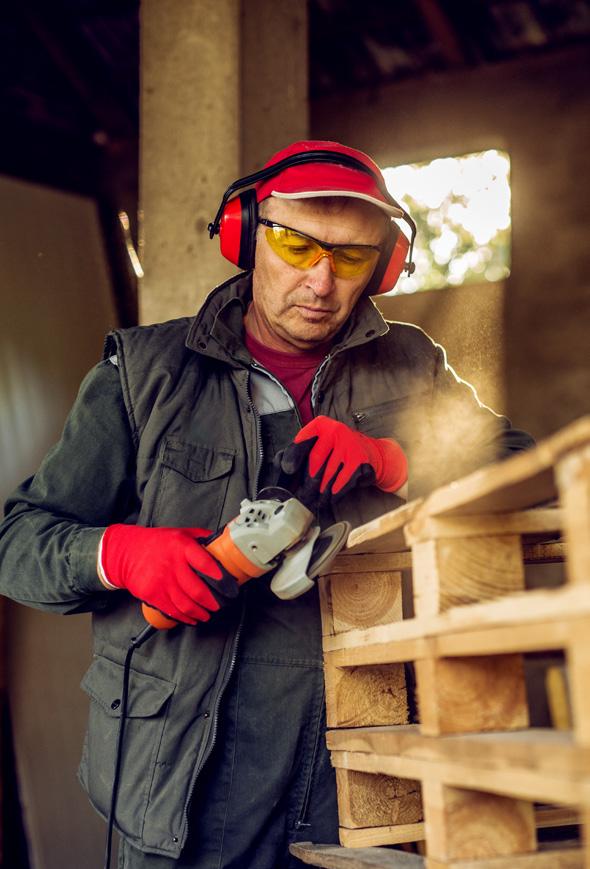
To learn more about the added lines of insurance service Forestry Mutual can offer. Visit www.forestrymutual.com Call 800-849-7788 to have an agent reach out to you today Email us at info@forestrymutual.com to set up an appointment.

FMIC 1ST QUARTER 2023 15
- Log Hauling - Non-Mechanized Logging - Mechanized Logging - Excavating - Stump Removal Operations - Grading (Forestry Roads) - Right of Way Clearing - Chipping Operations
LEGENDS OF FMIC
Forestry Mutual's Loss Control
They

are partnering with Virginia Occupational, Health & Safety (VOSH) and the Virginia SHARP Logger Program to give VOSH inspectors insight into the daily operations of a logging site.
FMIC 1ST QUARTER 2023 16
Who in their right mind would let a couple dozen OHSA inspectors to their working log site?
The hands-on relationships that Forestry Mutual has within the logging community are genuinely Legendary. When we asked our tight niche logging community who has the best and most inclusive loss control services? Without hesitation, they say, Forestry Mutual. Garnering the moniker of Best in Class, First Rate, Professional and Compassionate take work and time.
Our logging loss control has been the foundation of the company since its beginning over fifty years ago as the North Carolina Self-Insurers Fund, which grew over twenty years ago to the now famed Forestry Mutual Insurance Company. Hard work, dedication, sacrifice, and perseverance are what we respect in our clients, who work tirelessly in the wood products industry. We know that our clients expect the same dedication to perfection from their insurance provider. We've met that challenge in our Loss Control Department, led by Greg Plumley, Director of Loss Control. He and his team have made Forestry Mutual nationally and internationally recognized as having the best Loss Control services in the industry.
Harker, the owner of Pittsylvania Forest Products, and Mr. Jimmy Mastin, the owner of Mastin Logging, did just that. Both stepped up considerably to help the logging industry and OSHA.

To give an example of what Forestry Mutual does in the industry with our Loss Control. An extraordinary event took place in October 2022 in Franklin County, Virginia. Dr. Scott Barrett, Ph.D., Associate Professor at Virginia Tech, Forest Resources and Environmental Conservation, and Coordinator of the SHARP Logger Program, reached out to Greg Plumley to inquire if Forestry Mutual would be interested in assisting him in training a couple of dozen Virginia OSHA inspectors on the working environment and, in general, the world of logging in the woods.
Who in their right mind would let a couple of dozen OHSA inspectors to their working log site?

Greg reached out to two loggers he knew personally and long-time clients of Forestry Mutual who would have a working log site to demonstrate and train these inexperienced logging OSHA inspectors. Mr. Nathan

"We appreciate this opportunity to work with Forestry Mutual and the SHARP Logger Program." Says Marta Fernandez, Virginia OSHA Safety Program Director. She says, "everybody is very excited to come out here and be in-person with the training." There was one day of in-person classroom training to give the Virginia Occupational Safety & Health (VOSH) inspectors, who have never been on a logging site, an overview of forestry and harvesting operations in Virginia, which is why Marta reached out to Dr. Barrett.
Dr. Barrett and the SHARP Logger Program gave an in-class overview three weeks before the on-site training. During this time, Greg Plumley pulled his team together and secured the locations for the log site training.
R. Scott Barrett, Ph.D., Associate Professor at Virginia Tech, Forest Resources and Environmental Conservation, and Coordinator of the SHARP Logger Program.
L - R: Marta Fernandez, VOSH Safety Program Director and Justin Hodges, Federal Department of Labor.
FMIC 1ST QUARTER 2023 17
Chris Hudson, Loss Control Representative for Forestry Mutual, giving site safety briefing to VOSH inspectors.
The benefit to the logging industry and for everyone is immense. When 95% of Virginia OSH inspectors who will investigate an incident on a logging site have never been on a logging site, which can only lead to confusion and misunderstanding of the hazards that go into the world's third most dangerous profession. Having VOSH exposed to the working dangers that go into logging operations will only allow them to execute their investigations better. This priceless knowledge and firsthand exposure to a functional logging site demonstrate the willingness of Forestry Mutual to work with our regional partners, like Dr. Barrett and the SHARP Logger Program.
One of the main concerns that Virginia OSHA has is to have to send an inspector out to the woods on a logging fatality or injury, and they don't know what to expect when they arrive. Those inexperienced inspectors need to realize the hazards to them when they do come. Such as, they don't know what a "widowmaker" is. A widowmaker refers to broken branches left hanging in limbo on mature trees. The name indicates that such objects can kill forest workers by falling on them. Part of today's training is to teach them to look up for hazards and down for tripping hazards.

Chris Hudson, Loss Control Representative for Forestry Mutual, "what we want to accomplish today gives each of these VOSH inspectors an opportunity to see the equipment up close, the skidder, feller buncher to the loader and chipper." He continues, "My goal is to explain how the energy source for each piece of equipment is unique. So is the visibility of the operator in each piece of equipment." Chris adds, "having each of them sit in the driver seat of the skidder, loader, and feller buncher, lets them know firsthand how limited the visibility is." When you add cold weather, rain, dust, or muddy conditions, how the operator's visibility is reduced, which Chris adds, "high visibility clothing and communication either on the radio or by pre-determined physical hand signals, which is so vital to everyone's safety."

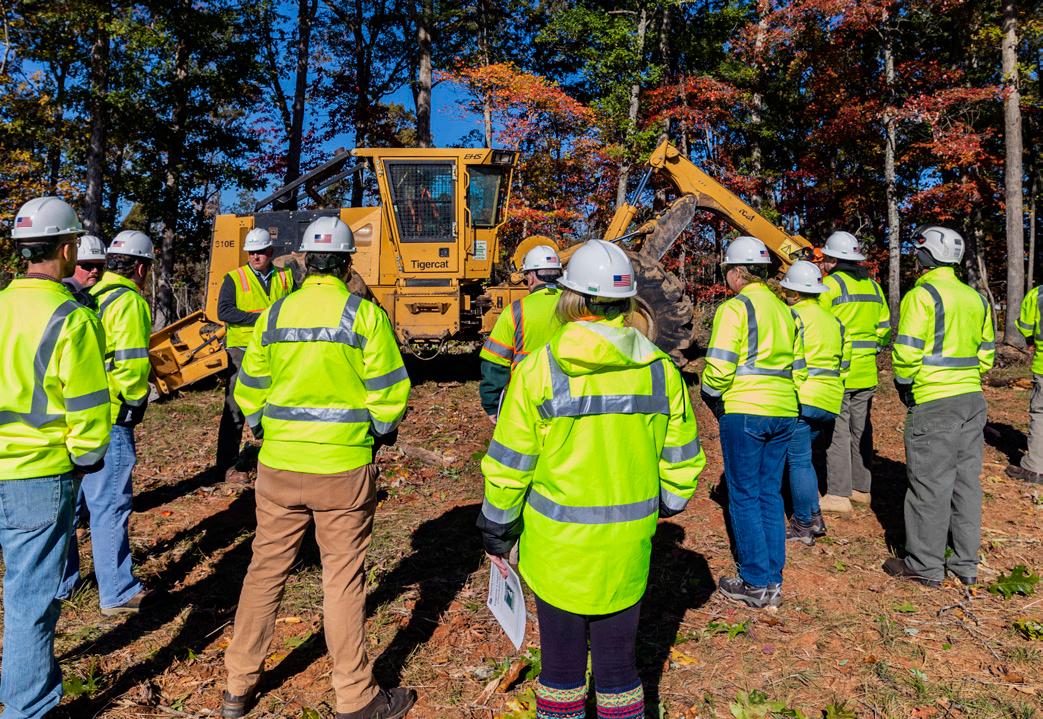
Greg Plumley could not be more satisfied with his team at today's event. Today he brought Greg Helton and Shawn Fulks, expert chainsaw felling trainers from Forestry Mutual. After the VOSH team visited each site on a logging job and had each piece of equipment available for close inspection, they had a few hours of manual felling instructions from Greg and Shawn. Shawn and Greg gave the manual felling training as referenced to the 29 CFR 1910.266 OSHA requirements. This in-person training gave the inspectors a real-world perspective on the hazards of felling timber.
The hands-on training would continue that week with another group of Virginia OSH inspectors. Virginia has some of the nation's best inspectors, and this forestry logging exposure makes them more top-notch in their profession. As Greg Plumley puts it, "we at Forestry Mutual are thankful for the opportunity to work with Virginia OSH to grow our relationship between OSHA and the logging industry whether it's here in Virginia or any of the other states across the country we operate in." Greg adds, "going home the way you came to work is the first mission at Forestry Mutual, now, and into the future."
He adds, "safety pays."
Chris Hudson, Loss Control Representative for Forestry Mutual, goes over the operations and safety issues with operating a skidder.
L-R: Greg Helton, Shawn Fulks, Chainsaw Felling & Safety Trainers and Greg Plumley, Director of Loss Control for Forestry Mutual Insurance.
FMIC 1ST QUARTER 2023 18
A widowmaker refers to broken branches left hanging in limbo on mature trees.
NORTH CAROLINA
Carolina Loggers Association
Forestry Mutual pays $300 of the $350 annual dues required for CLA membership for nearly 400 of its policyholders. The CLA is most grateful for FMIC's contribution. To honor this contribution, the CLA does an annual Forestry Mutual promotion for our members. We bill our members for the remaining $50 of their membership and offer options for different levels, and in return, they receive CLA and Forestry Mutual logo gear. Those participating will be named in the Carolina Logger magazine and placed in a drawing for a door prize. This is a great way to help both organizations in advertising promotions and see the value that our members receive.
Guill, Executive Director, Carolina Loggers Association
The Carolina Loggers Association (CLA) is a nonprofit corporation formed to help associate loggers for their benefit. Our mission is to promote logging professionalism and business opportunities for the entire forest products network that logging supports by representing a specific and unified voice for timber harvesters in North Carolina.
Becoming a member of the CLA as a logger or partner member comes with great representation and many benefits. CLA members have access to discounts such as Goodyear tires, International and Kenworth trucks, hydraulic hoses, and Vestige GPS forward and rearfacing video cameras, to name a few items. During 2022, many loggers faced difficult challenges in their businesses, and the CLA worked hard to establish savings that would benefit our loggers in any way. Unfortunately, some of the same challenges will also find their way into 2023.
The CLA is very fortunate to have such a valuable partnership with Forestry Mutual Insurance Company (FMIC). FMIC provides a CLA membership for all North Carolina logging and trucking companies with their workers' compensation insurance through Forestry Mutual. Forestry Mutual realizes CLA's value for the logging industry and what our endorsement adds to its marketing strategy.
The CLA Annual Meeting is right around the corner, March 31st through April 2nd, 2023. This year's event will be held in Wilmington, NC, at the Hotel Ballast. Each year the CLA strives to have a bigger and better event than the year before, and so far, we have been successful. We encourage logging members to attend, especially if you have never been. People only realize the benefit of these events once they have attended one. Not only do you learn a lot from our speakers about the logging industry, but networking with others in the industry experiencing the same challenges you are has proven to be invaluable.
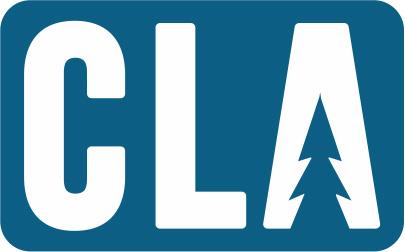
We have a great line-up of speakers and entertainers for this year's meeting that you will not want to miss. Not only will you gain valuable information attending this event, but you will also have a large time! Most use it as a weekend getaway. Each year the CLA holds an auction to benefit Log-A-Load For Kids. Last year the CLA raised over $30,000 to benefit local children's hospitals through Log-A-Load. This is always a humbling event to witness and be a part of. Registration is now live on the CLA website www. ncloggers.com/2023-annual-meeting.
The CLA is excited to continue our partnership with Forestry Mutual in 2023. FMIC has big plans with new leadership for the future of their company, and CLA is very fortunate to be included in their future. My goal as Executive Director is to continue promoting Forestry Mutual to our current members and the entire logging industry in a way that will continue to grow both organizations. We all face the challenges this industry has together in our daily businesses, and I plan to devote my time to being a voice on behalf of our loggers while they spend their days in the woods growing their own business. The CLA's partnership with Forestry Mutual will allow me to do
 Jonzi
Jonzi
FMIC 1ST QUARTER 2023 19
PARTNERSHIPS ARE WHAT MAKE OUR INDUSTRY SUCCESSFUL FOR THE NEW YEAR.
wood-related industries and recruit new wood manufacturers to our state. Special emphasis is given to supporting loggers and wood industries in Tennessee's ten economically distressed and thirty-two at-risk counties. Forestry is identified as the primary source of income in many of these counties.

Tennessee's Governor has provided funding for the safe operation of log trucks with overhang flags purchased through a grant provided by the Tennessee Dept. Of Agriculture.
TENNESSEE
Tennessee Forestry Association
TENNESSEE'S LOGGERS ARE A BIG COMPONENT TO STATE'S ECONOMY, AND GROWING IN 2023
Candace Dinwiddie Executive Director, Tennessee Forestry Association
In the Volunteer State, the Tennessee Forestry Association (TFA) is so very proud to work closely with our logging professionals.
Our loggers are active in their communities and vital to rural Tennessee's economies. Thanks to our loggers, our wood products industry employs over 85,000 Tennesseans with a combined economic output of $21.7 billion annually to our state's economy.
Tennessee's Governor and Legislature recognize the importance of timber harvesting and our wood products industry. Governor Bill Lee's administration has determined 40% of Tennessee's 200 + sawmills and other wood manufacturing facilities are located in economically distressed and at-risk counties.
Flags are provided at no cost to log truck owners and contractors. Loggers and haulers may make donations for the flags, with all contributions directed to Tennessee's Log-a-Load for Kids campaign. Also, dash cams, PPE, and road hazard signage costshare funding are available through grants from the Tennessee Department of Agriculture in partnership with the Tennessee Forestry Association.
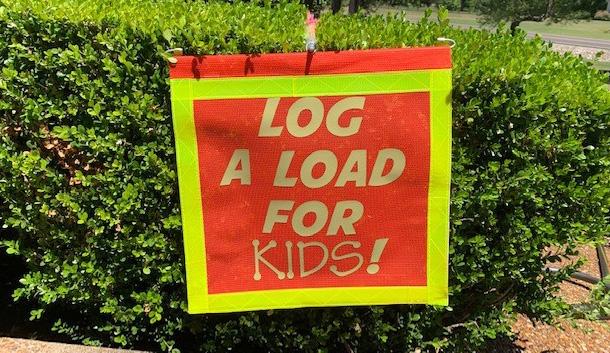
Without loggers and forest products industries, there would be very few job opportunities and reasons for young people to live and work in the economically challenged areas of Tennessee. Governor Lee's administration is working hard to ensure the wood products economy stays strong in Tennessee and even recently appointed a Forest Business Consultant to help grow existing logging operations and
DALE SEALS AND FAMILY 2022 TN MASTER LOGGER OF THE YEAR
TFA would also like to congratulate Dale Seals, Tennessee Master Logger of the Year. Dale is a client of Forestry Mutual Insurance and is highly respected across the state. Dale will be honored by the Tennessee General Assembly during the 113th General Assembly in early 2023.
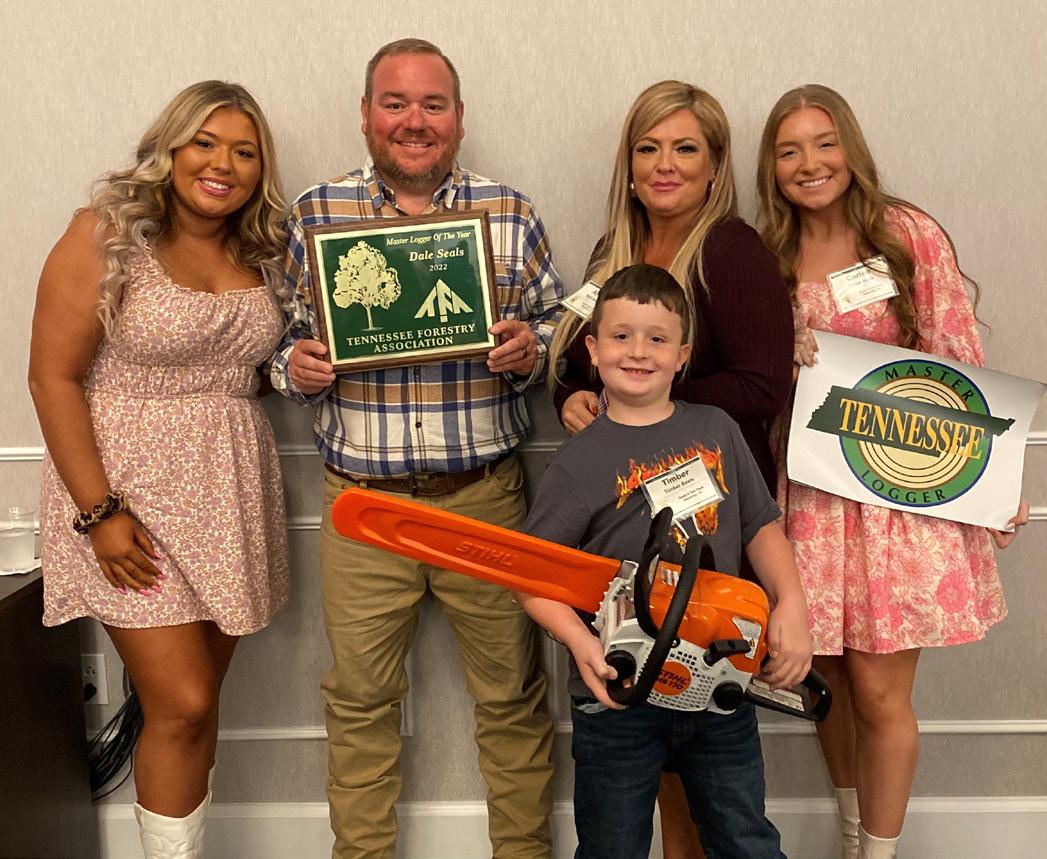
20 FMIC 1ST QUARTER 2023
LOG A LOAD OVERHANG FLAG
Story Continues - TOP of Page 27
VIRGINIA
Virginia Loggers Association PREPARE. CULTIVATE. SOW.
Jenkins, Executive Director, Virginia Loggers Association
Virginia Loggers Association has seen and accomplished much over its short existence. We are proud of the relationship with Forestry Mutual Insurance, who stepped in around 2008 and helped super boost VLA’s finances. They have also been an outstanding partner in safety for logging and wood product mills.
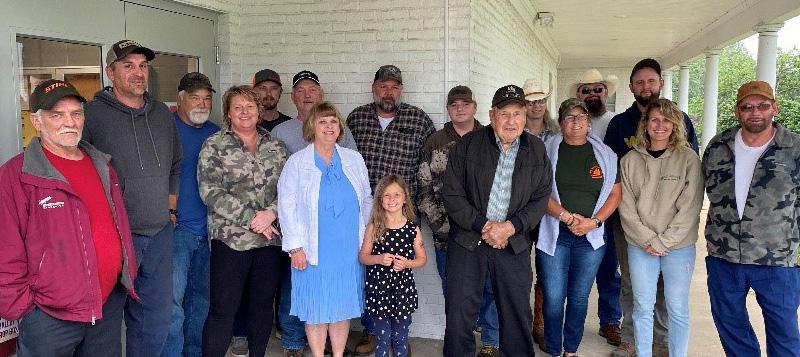
We appreciate the invitation from Forestry Mutual Insurance to write an article about our thoughts for 2023. This requires us to look into the future. And regardless of where we look for guidance, the news could not be gloomier, especially on the economy. However, VLA is excited about the possibilities to emerge in 2023 by working closely with Forestry Mutual Insurance.
Do you prefer to look at your glass as half empty or half full? I am writing with complete and full faith that our glass is half-full, especially with Forestry Mutual Insurance Company!
As I look back at VLA’s twenty years, I call it “Preparation”! Some will disagree, especially those who founded VLA and felt the pain of getting started and taking every step to reach where we are today. Those great people would probably say we are beyond preparing but would emphasize the important role Forestry Mutual Insurance has played in preparing us!
But here is my point!
Every step from the beginning has been to prepare this remarkable trade association for the change we may see in the future. For instance, many will point out the changes in our markets, the relationships between loggers and mills, and of course, the recent change in leadership at Forestry Mutual Insurance. We have absolute confidence that Mr. Dine has the best interest of VLA and other trade associations going forward. The two are symbiotic, helping each other to become great organizations.
So, let me call 2023 the first year of VLA’s next chapter in the “cultivation period.” Cultivation in gardening is normally associated with the idea that seeds have been planted and germinated, so steps must be taken to ensure those plants grow and maximize their space.
VLA will look ahead into an uncertain economic future with the idea its glass is half-full and filling up! We know our first twenty years secured a solid foundation with the great partnership of Forestry Mutual Insurance and all our supporting members in every category of service.
During our preparation period, VLA listened, explored, learned, and built its framework. Now we look forward to listening more, exploring more, learning, and building future relationships that will strengthen our members and our entire industry.
VLA will always choose to listen to its members and industry, explore every level of policy making to learn everything about changes impacting our industry, and we will build our communications to ensure our members can grow to maximize their rightful space in business and our society.
VLA will do everything possible to cultivate the interests of our members and help the association to become a trusted source that stands up for its members and the industry. We look forward to meeting our future with Forestry Mutual Insurance.
We are excited about 2023 and the future partnership with Forestry Mutual Insurance. Our glass will be full! The next generation depends upon us. Let’s cultivate together and sow seeds for future generations, and we can and will surely “reap.

FMIC 1ST QUARTER 2023 21
MADISON COUNTY LOGGERS ASKED FOR TAX RELIEF AND VLA DELIVERED!
Ron
FORKLIFT SAFETY REMINDERS
 By Greg Plumley, Director of Loss Control
By Greg Plumley, Director of Loss Control

Forklift trucks are a necessity in most warehouse and mill facilities. Although the risks associated with operating machinery are ever-present – collisions, tipping, and falling cargo, to name a few – there are rules organizations and operators can follow to prevent these and other incidents from occurring.
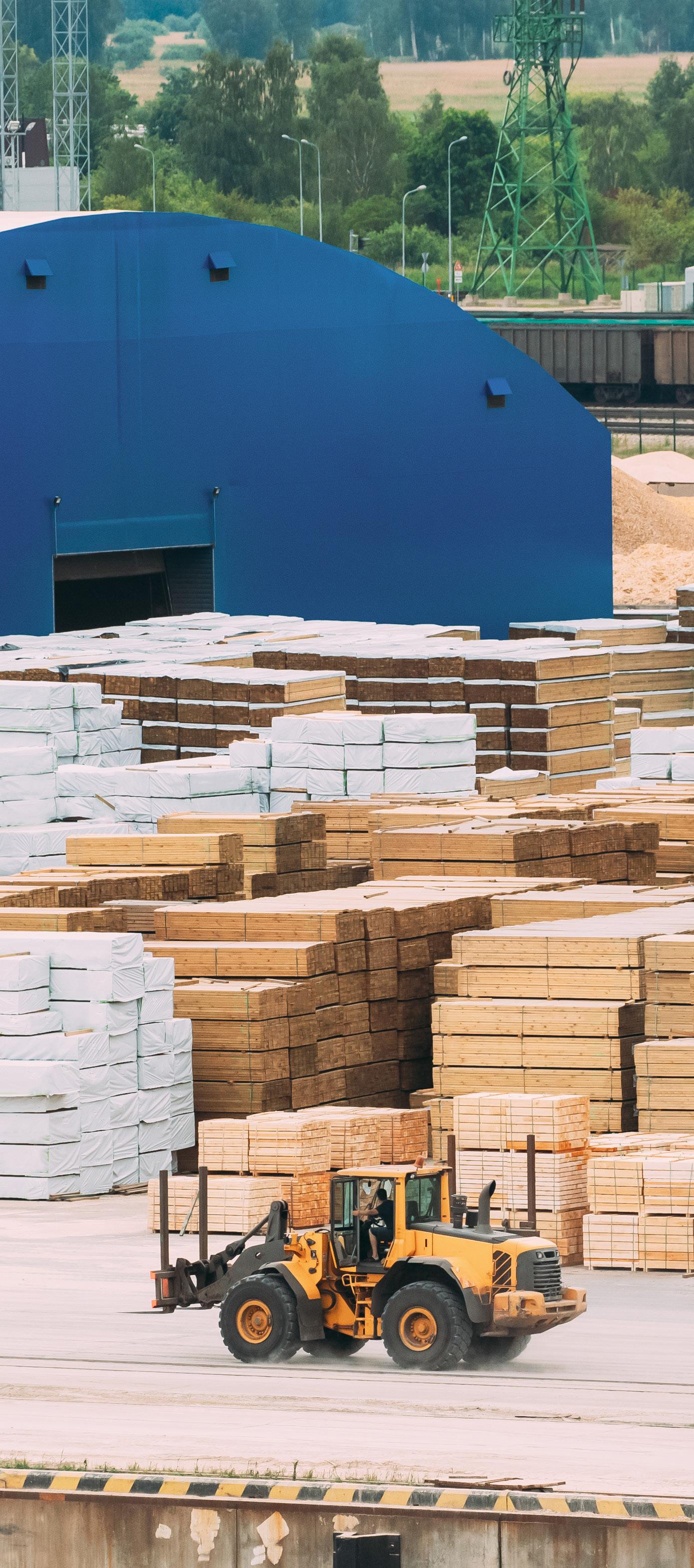
GENERAL OPERATION:
• Get approval: Gain authorization before beginning any forklift operation.
• Safety checks: Before each job, inspect brakes, steering controls, forks, hoists, warning devices, lights, and any hazardous conditions. Any defects should be immediately reported to a supervisor.
• Hazards: Determine the job to be done and any special instructions concerning possible hazards, including handling any hazardous or toxic substances.
22 FMIC 1ST QUARTER 2023
• Overhead protection: Make sure overhead protection is in place and at adequate projection above the truck.
WHEN LOADING THE TRUCK:
• Capacity: Know the vehicle's capacity and load within its limits.
• Overloading: Do not move a questionable or unsafe load. Inspect for overload, loose materials, or poor balance.
• Engaging the load: Avoid lifting loads with one fork of a forklift truck. Position loads evenly on the forks for proper balance.
• Pushing loads: Do not push heavy loads or move boxcars with one corner of a truck.
• Working clearance: Use special care and watch swinging motion when working from high stacks and when handling long lengths of pipe, bar stock, lumber, etc. Use special care and check the overhead room when stacking materials near heaters, electrical wiring, pipes, or other fragile or dangerous equipment.
• Collisions: Avoid striking any object with the fork tips. Slow down and alert at cross aisles; sharp curves; ramps; dips; blind corners; wet, slippery, or rough floors; in congested areas; and when vision is limited or obstructed.
• Carrying the load: Keep the load on a lift truck against the carriage. Keep the mast of the truck tilted back to cradle the load. When lifting, lowering, or carrying loads, remember to keep the mast of the vehicle slightly tilted back – never forward. Lift loads slowly and avoid any jerking motion.
• Starting and stopping: Start and stop trucks gradually and slowly. Always look around before starting to move.
• Load position: Never travel with a raised load. Carry the load as close to the floor as possible.
• Safe driving: Establish and strictly enforce a traffic pattern and speed limit. Prominently display stop signs and other directional signage. Keep aisles adequately lit, free from clutter, and well-marked. Use special care when approaching intersections and drop areas.
• Ramps and inclines: Use low gear when going down ramps or steep grades. Keep the load in the front on upgrades and in the back on downgrades.
• Docks and platforms: Keep clear of the edge of loading docks and platforms.
• Unloading: Tilt an elevated load forward only when it's directly over the loading place. Keep the load as low as possible.
SAFE OPERATION:
The safe operation of forklift equipment reduces risks to life and property and allows for the efficient and profitable handling of materials.
Most importantly, forklift operators must be trained and qualified to operate the specific truck they have been assigned, closely following all instructions provided by the vehicle manufacturer. There are also general guidelines all operators can use to help ensure safe operation.

FMIC 1ST QUARTER 2023 19
"Safety is a full-time job, don't make it a part-time practice."
MISSISSIPPI
Mississippi Forestry Association

MFA HAS A NEW EXECUTIVE DIRECTOR
 Casey Anderson, Mississippi Forestry Association Executive Director
Casey Anderson, Mississippi Forestry Association Executive Director
Happy New Year! Mississippi Forestry Association (MFA) is looking forward to all 2023 will bring, and I am thrilled to have a front-row seat as I serve in my new role as MFA executive director!
MFA saw several staff changes in 2022, including the announcement of Tedrick Ratcliff stepping down from his role as executive vice president at the end of July. Our staff pulled together to ensure the association ran smoothly during the interim period, and I appreciate the dedication of MFA member and past president, Ellen Dabbs, who served as the association's interim executive vice president from August through the end of November. I officially began my role as executive director on December 1, 2022, and our entire MFA staff and I stand ready to serve our membership well in 2023.
MFA saw a number of successes in 2022, including moving the Professional Logging Manager Program under the banner of MFA and partnering with ForestryWorks to provide workforce development and log truck driver recruitment opportunities to our members. Our association continues looking for new ways to provide benefits and services that help our members succeed daily. I want to expand on my mention of our ForestryWorks partnership.
MFA has long advocated for workforce development in Mississippi, but the partnership with ForestryWorks provides numerous avenues to grow our commitment and efforts. ForestryWorks has a robust catalog of career videos and features that provides a great overview for students and anyone searching for a new career path.
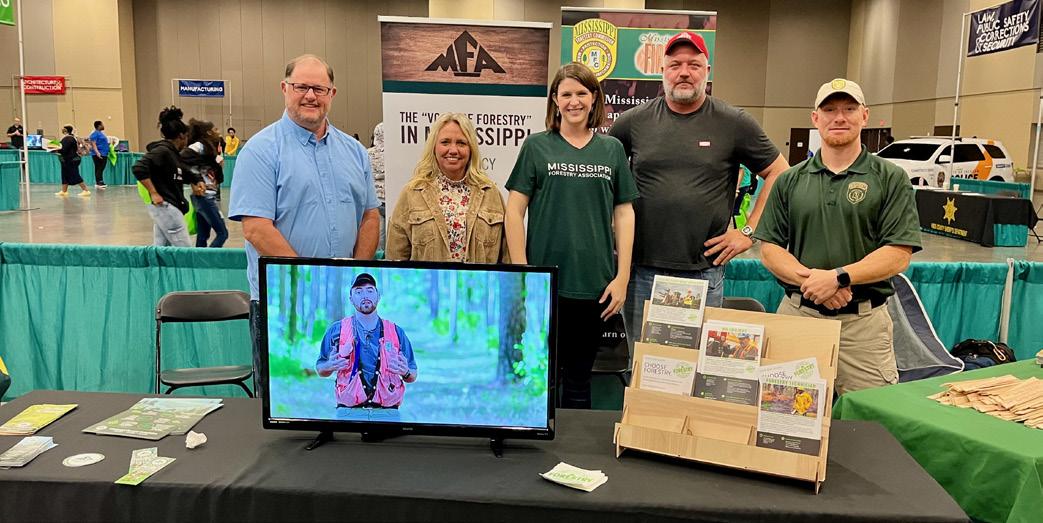
We commonly have calls from members looking to hire new employees, and through our ForestryWorks website, MFA now has a job board open to all MFA members at no additional charge!
We also have access to a log truck driver recruitment program. Logging companies looking for employees can complete a recruitment form where they set specific requirements and list the counties where they work. A separate form allows anyone looking for a job as a driver to share their years of experience, counties where they are willing to work, and current CDL status.
Applicant information is then sent to companies with matching requirements. All of this can be found at www.forestryworks.com/Mississippi.
New partners such as ForestryWorks and long-standing partners such as Forestry Mutual offer many benefits to MFA members, and we see great value in those partnerships. Forestry Mutual shares in MFA's desire to see our members succeed and offer them highly rated insurance options, including workers' compensation, property, inland marine, general liability, and business auto policies.
Our commitment to our members is long-lasting, and so is our partnership with Forestry Mutual. We appreciate their support of the association and look forward to many more years of working together to further the forest and logging industries in Mississippi!

24 FMIC 1ST QUARTER 2023
COLD WEATHER SAFETY TIPS
 Greg Plumley – Director of Loss Control
Greg Plumley – Director of Loss Control
Logging operations in the Southeastern United States during the winter vary greatly depending on the region where you operate. Whether you're in the sandhills of South Carolina or the Mountains of Tennessee, the severity of the weather can swing without notice. This year has had some cold temperatures, and we want to be sure we are all prepared.
Forestry Mutual, as always, has industry safety in mind when we send out reminders and precautions for hazards that occur during the winter months when working outdoors as loggers. In cold weather, your saws, trees, and bodies react differently. By taking simple precautions, everyone can go home safely at the end of each day.
YOUR BODY:
It's not rocket science, and it makes sense to dress differently in cold weather, we all know this, but we remind you that layering is a suitable method. In the chilly mornings and after your body warms up, you may need to shed a layer, but keep that layer of clothing close. If you stop working to chat with a coworker or forester, you may need extra clothes to maintain your core body temperature.
• Having the right gear will make all the difference in keeping you warm.

• Wear gloves with liners.
• Start slowly or do some light exercise in the morning to get your body warm and blood flowing.
• If you get too cold, start a fire (if landowners allow it) or go to the truck and warm up.
• Don't rush!
• If working in the mountains, as you move to set chokers or walk around the landing, do it with caution.
• Be deliberate in where and how you step because the snow can mask hazards, and ice can create slip and trip hazards.
DEHYDRATION:
Dehydration in the winter is a severe health hazard. Many do not realize dehydrating is very easy because you don't feel as thirsty as in the summer months. Carry water with you and often drink, even if you are not sweating. Water escapes your body through your breathing/respiration in cold and dry conditions.
GEAR:
• No jacket or sweatshirt with hoods - wear a stocking cap or beanie
• Thicker gloves or liners
• Extra socks
• Long johns or wool
• Extra set of clothes
• Rain gear
DRIVING:
Last but not least, winter brings many challenges to driving on log roads and highways. Please, refrain from pushing the limits of yourself, your equipment, and the environment. If the weather looks too bad, stay home.
Below are some winter driving tips that apply to the Forestry Mutual 10-Point Safety Checklist.
• Keep your vehicle in good working condition. Conduct your daily pre-trip and post-trip inspections and report issues to your supervisor.
• Scrape the snow and ice off your headlights, and always travel with headlights on.
• Ensure the vehicle is full of fuel before heading out to the woods.
• Slow down and take your time.
• Accelerate and stop slower.
• Maintain more room between you and the vehicle ahead.
• Black Ice: Slow down when approaching bridges, shady areas, intersections, and off-ramps.
• Keep an ice scraper, shovel, tow strap, and jumper cables in the vehicle.
• Keep extra clothes, food, and water in the vehicle.
• Drive for the current road conditions.
• Do not push your driving abilities.
FMIC 1ST QUARTER 2023 25

26 FMIC 1ST QUARTER 2023 OUR MISSION To provide the forestry community with high-quality insurance that emphasizes safety, excellent customer service, and competitive pricing while advocating for our forest resources’ sound use and management. Truck Driver Safety Awareness Training Classroom and/or on-site instruction Company Safety Program & Written Procedures New Employee Training Guide Safety Policy & Rules Forklift Safety Training Lockout/Tagout Training On-Site Safety Meetings Supervisors Safety Training Mock OSHA Inspections Annual OSHA Required Training Safety Policy and Rules Lockout/Tagout Training Logger Safety Workshops Logging Equipment Familiarization Storm Damage & Salvage Training On-site Chainsaw Training Overhead Hazards Training Safety Alerts Weekly Text FMIC Quarterly News Magazine Safety Meeting Sheets (Quarterly) Safety Meetings On-Site Slip, Trips & Falls Training Supervisor Safety Training Fire Prevention (T.E.A.M.) CUSTOMER SERVICE DRIVEN ACCIDENT INVESTIGATION CLAIMS ANALYSIS AND REVIEW WHOLESALE PRICED SAFETY EQUIPMENT SAFETY TRAINING MATERIAL AND SAFETY VIDEOS 4 3 2 1 5 ANNUAL/QUARTERLY ON-SITE SAFETY INSPECTIONS FOR MORE INFORMATION ON FORESTRY MUTUAL INSURANCE WWW.FORESTRYMUTUAL.COM GENERAL INDUSTRY LOGGING INDUSTRY Forestry Mutual is more than an insurance company. We offer safety training and safety programs tailored to meet your specific needs. Our experienced loss control staff delivers your customized program in a hands-on personal approach to keep you and your employees safe and promote open discussion.
The Tennessee Forestry Association and the State of Tennessee appreciate the impact Forestry Mutual Insurance Company has made on the logging profession in our state. Forestry Mutual's influence and priority on safety and communications have raised the visibility of Tennessee's loggers and the recognized economic contribution our logging force makes to Tennessee's economy. The Tennessee Forestry Association is very thankful to Forestry Mutual Insurance for providing coverage and peace of mind to many logging families in the Volunteer State. From The TFA convention to the Tree Day at the Legislature to providing safety programs for Master Loggers, Forestry Mutual representatives are part of our forestry family in Tennessee.
To learn more about the Tennessee Forestry Association and how to become a member, visit: www.tnforestry.com.
To get a quote and see why we endorse Forestry Mutual Insurance for the wood products industry here in Tennessee visit: www.forestrymutual.com.

ANNUAL REMINDER
Topic: OSHA Recordkeeping Requirements
It is that time once again to comply with the OSHA requirement to post a summary of the total number of job-related injuries and illnesses that occurred during the 2022 calendar year. OSHA requires that summaries be posted from February 1 to April 30, 2023. However, employers need only post the Summary (OSHA Form 300A), not the OSHA 300 Log. Make sure the summary is complete. It must list the total number of job-related injuries and illnesses that occurred in 2004 and were logged on the OSHA 300 form.

Employment information about the annual average number of employees and total hours worked during the calendar year is also required. Companies with no recordable injuries or illnesses in 2004 must post the form with zeros on the total line.
For employees to view the OSHA 300A Summary, post it in a common area such as a breakroom, on a bulletin board, or wherever you post other important notices to employees.
Also, a reminder that employers with ten or fewer employees, and employers in certain industry groups, usually are exempt from federal OSHA injury and illness recordkeeping and posting requirements.

FMIC 1ST QUARTER 2023 27
Cont. Partnerships in Forestry - Tennessee Forestry Association





















































 By Greg Plumley, Director of Loss Control
By Greg Plumley, Director of Loss Control




 Casey Anderson, Mississippi Forestry Association Executive Director
Casey Anderson, Mississippi Forestry Association Executive Director

 Greg Plumley – Director of Loss Control
Greg Plumley – Director of Loss Control





